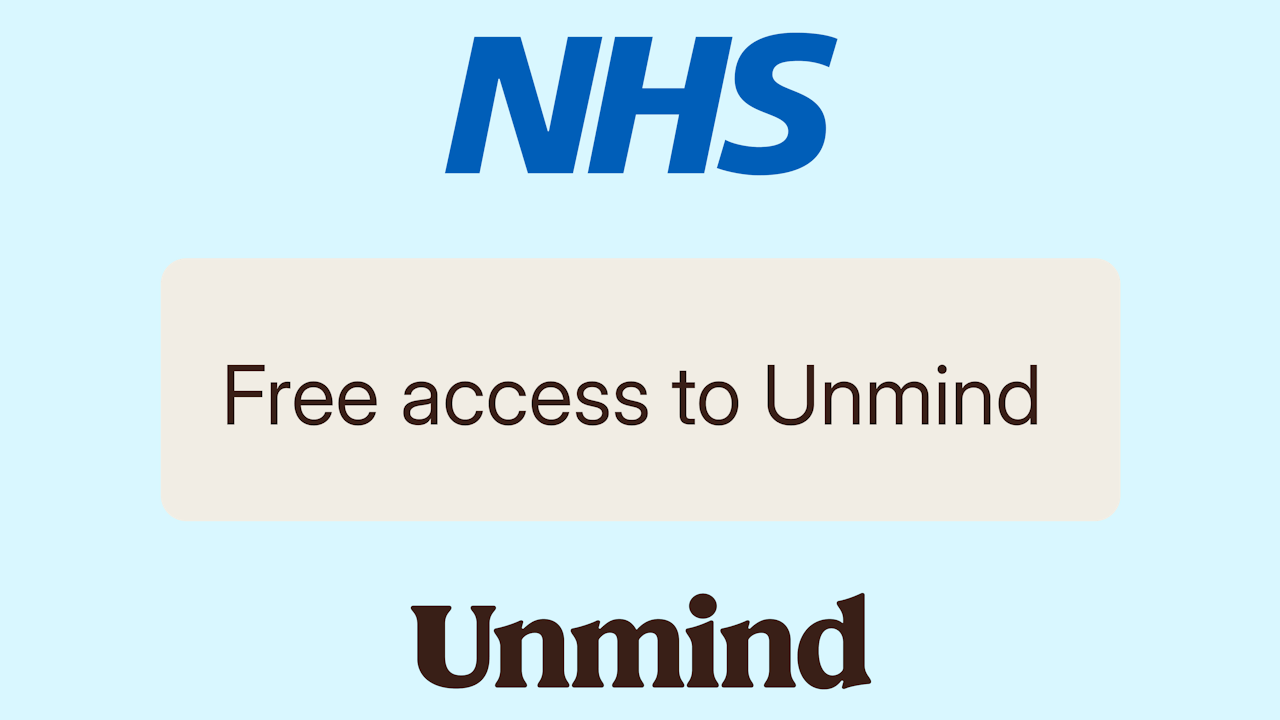Helping NHS heroes: 4 Unmind stories from the frontline

Dr. Jazz Croft

Content
- It's time to care for carers
- A catalyst for destigmatisation
- A time of widespread uncertainty
- The importance of self-care
- The power of a proactive mental health platform
- Free access for all NHS staff
- Want to learn more?
Since March 2020, Unmind has offered every NHS employee free, unrestricted access to our platform – to support their mental wellbeing during the pandemic. Today, we check in with four workers. These are their experiences.
If you're an NHS employee, you can sign up to Unmind for free here.
It's time to care for carers
Last March, Unmind gave all 1.5 million NHS employees access to our digital mental health platform, free of charge. Why? Our health staff have experienced disproportionate levels of pressure, typically with insufficient access to mental health support.
While 1 in 6 UK adults will experience mental ill-health in any given year, a staggering 50% of health workers saw their mental health decline during the pandemic’s early days. Another study showed health and social care staff had drastically higher levels of anxiety, depression and PTSD than the general population.
A catalyst for destigmatisation
Last spring, at the same time society at large opened up about mental wellbeing – breaking down decades-old stigma and basking in the fact that, yes, we all have mental health, all the time – many frontline workers felt they needed to maintain a brave face.
This was certainly the case for Bernadette, a senior oncologist who manages a team of 120 clinical staff at a specialist cancer hospital in Wales. A reluctance to show weakness was as much for her staff as it was for patients.
“I think there’s that element of just wanting to hold up the sky,” she now admits. “Just wanting to make sure nobody saw me wobble, nobody saw us struggle, because if that was true then there must be something wrong.
“I became overly cautious about what I shared and what I said,” she adds. “Because if I said we didn’t know what was happening, it could lead to an increase in the fear or anxiety among the team as a whole.”
A time of widespread uncertainty
It’s easy to forget the pandemic’s early days were a time of widespread uncertainty. Now, the coronavirus has transformed us all into small-time pathogen experts, but back at the beginning, even scientists weren’t sure. As the UK entered lockdown last March, we all read scary news articles about catching Covid from cardboard (with many sterilising their shopping as a result) infected surfaces, even fresh air outside.
Imagine that stress and confusion but, rather than staying home to save lives, you work in a busy hospital. So, alongside the constant pressure of trying to protect patients as part of the day job, you’re tasked with keeping safe from an invisible enemy.
“I know everybody was in the same position, but we didn’t know what was going on,” Bernadette confirms. “There were definitely times, certainly from last March through to May and June time, where we didn’t know enough and were very much left to hope for the best.”
This, she admits, weighed heavy on her mental health: “One of my jobs is treating patients accurately, and another big part of my job is looking after my team. I just didn’t know for sure if I was keeping them safe or not. So it was quite a big burden to personally carry.”
The importance of self-care
Long before Covid, the vast majority of us were alive to the importance of self-care. Those small things that ground us, enrich our daily lives, and restore us to somewhere approaching fulfilment. Problem is, when a highly contagious virus limits a whole nation’s freedom – bar a jog and a food shop – to their own four walls, even simple pleasures drift out of reach.
For exhausted frontline workers, the lack of any escape hit hard. Yes, this does boldly underline their hero status – sacrificing their daily lives, plus their sense of self and mental wellbeing, for a higher purpose (helping total strangers) – that doesn’t mean it didn’t sting.
“I love singing, so I’m in a couple of choirs,” says Sandy, a GP alcohol liaison nurse. “I live on my own, which in general is absolutely fine, but as soon as I couldn’t be in choirs, meet up with friends or do the very things that keep my mental health doing well, I really started to struggle.”
For some health workers, even going to work wasn’t possible – either due to remote work, or as they themselves contracted Covid-19. Like Saira, a mental health coach practitioner.
“I had all the symptoms,” she says, “but the time there wasn’t a general diagnosis out there. So I went along to my doctors and was diagnosed with a lower respiratory tract infection.”
Anyone with even a passing knowledge of Covid-19 (that’ll be everyone) knows the spectrum of illness varies from zero symptoms to utter debilitation. And, despite their track record as superheroes, NHS staff weren’t immune to this grim health lottery.
“It knocked me completely off my feet for five weeks,” Saira continues. “I was off work, at home and really unable to take more than 25 or so steps to the bathroom and back. I really struggled with that.”
Like many forced to self-isolate from friends, colleagues and loved ones, Saira’s time in quarantine had a negative impact on her mental health. Not only that, this all went down before the first national lockdown – which then came into force just as she started to recover.
“That was really profound,” she says. “Just when I was starting to gain strength and better wellbeing, the rest of the country was in lockdown. So it was an even longer time of not having that connection.”
She adds: “All of my colleagues were working from home, so the segregation, and not having that connection, was really challenging … it was a sense of real loneliness.”
The power of a proactive mental health platform
In case you don’t know, Unmind is a platform that takes a whole-person approach to mental health. By harnessing a full sweep of digital, science-backed tools, it empowers individuals to measure, understand and improve every factor that defines their wellbeing – from coping to calmness, sleep to happiness.
Unlike traditional wellbeing solutions (that intervene once a problem has already occurred), Unmind is fully proactive. What does this mean? Think prevention, not cure. In the same way brushing your teeth helps avoid a painful root canal, Unmind’s clinically-driven features can decrease the chance of mental ill-health taking hold, or even starting.
This is especially important for NHS staff. Even if Covid was purged from our planet tomorrow, its scars would endure. There is already serious talk about health workers suffering from PTSD, and you only need look to past major tragedies (such as 9/11, Hurricane Katrina and Sars) for proof the mental aftershock lasts years, if not a lifetime.
It’s a fact not lost on Sandy – herself a qualified mental health nurse. “Once we do get through this, the repercussions are going to be felt so hugely,” she concedes. “When the chaos has abated, that’s when people are going to have the time to really realise what they’ve been through, and what support they need.”
For Bernadette, the anxiety over keeping her team safe remains raw, more than a year later: “I don’t think that will go away until [Covid-19] has gone away,” she says. “Until I can see them smile without a mask; until we can hug each other when we feel like it. That’s when I’ll feel better.”
The need for targeted support has never been more urgent.
Free access for all NHS staff
As outlined up top, Unmind began offering free accounts to NHS workers last spring. It’s a policy that remains to this day, and the impact on the frontline is real.
“I would say that it’s a very, very simple and easy app to use, and I think it’s very welcoming,” says Jermaine, who works in NHS learning and development. “Everyone should use this app, but especially within the NHS, where mental health is such a key thing, at a time where it’s very easy to struggle.
“Even if it’s just a few minutes a day to use some of the Tools, or follow one of the Series. You won’t regret investing in your mental health, and Unmind is one of the easiest, and friendliest, and most accessible ways to do it.”
Bernadette says: “It’s meant the world. Getting a free pass into Tesco when there’s a queue is great, but Unmind is the one that will stick with me. It’s the one I’ll keep going with and the one that really matters to me.”
She adds: "It’s just there, in the moment, and I take what I need, when I need it. Then I take a deep breath, pull on my flak jacket, and go back out again.”
As Covid (fingers crossed) fades into less of an emergency, more a passing irritant, it’s vital we don’t assume our mental wellbeing will disappear alongside it. It’s with us, and is in constant flux. We move from surviving to thriving; disengaged to engaged; struggling to focused, depending on the day we’re having. But remember, the more you measure it, the more you can manage it.
So, whether you’re an NHS hero, an HR manager or company exec (or literally any other job not mentioned in that very short list) remember to treat your mental health like your dental health.
If you don’t fancy a metaphorical root canal, we suggest you start brushing, stat.
Want to learn more?
The NHS is one of many companies, including Uber, British Airways, Marks & Spencer, and Samsung, that uses Unmind to empower their employees to lead more balanced and fulfilling lives.
If your organisation isn't one of them, and you want to learn more about nurturing mental health with Unmind, click here to book a chat with one of our specialists.
NHS worker unsure how to get started with Unmind? Take a look here.
About the Author

Dr. Jazz Croft, Senior Scientific Liaison
About the Author
